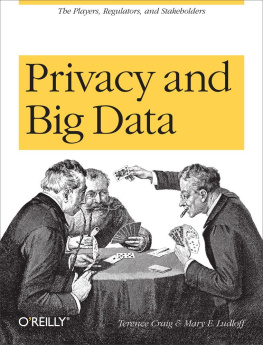Carissa Véliz - Privacy is Power: Why and How You Should Take Back Control of Your Data
Here you can read online Carissa Véliz - Privacy is Power: Why and How You Should Take Back Control of Your Data full text of the book (entire story) in english for free. Download pdf and epub, get meaning, cover and reviews about this ebook. City: London, year: 2020, publisher: Transworld, genre: Politics. Description of the work, (preface) as well as reviews are available. Best literature library LitArk.com created for fans of good reading and offers a wide selection of genres:
Romance novel
Science fiction
Adventure
Detective
Science
History
Home and family
Prose
Art
Politics
Computer
Non-fiction
Religion
Business
Children
Humor
Choose a favorite category and find really read worthwhile books. Enjoy immersion in the world of imagination, feel the emotions of the characters or learn something new for yourself, make an fascinating discovery.
- Book:Privacy is Power: Why and How You Should Take Back Control of Your Data
- Author:
- Publisher:Transworld
- Genre:
- Year:2020
- City:London
- Rating:4 / 5
- Favourites:Add to favourites
- Your mark:
- 80
- 1
- 2
- 3
- 4
- 5
Privacy is Power: Why and How You Should Take Back Control of Your Data: summary, description and annotation
We offer to read an annotation, description, summary or preface (depends on what the author of the book "Privacy is Power: Why and How You Should Take Back Control of Your Data" wrote himself). If you haven't found the necessary information about the book — write in the comments, we will try to find it.
Carissa Véliz: author's other books
Who wrote Privacy is Power: Why and How You Should Take Back Control of Your Data? Find out the surname, the name of the author of the book and a list of all author's works by series.
Privacy is Power: Why and How You Should Take Back Control of Your Data — read online for free the complete book (whole text) full work
Below is the text of the book, divided by pages. System saving the place of the last page read, allows you to conveniently read the book "Privacy is Power: Why and How You Should Take Back Control of Your Data" online for free, without having to search again every time where you left off. Put a bookmark, and you can go to the page where you finished reading at any time.
Font size:
Interval:
Bookmark:

CARISSA VLIZ is an Associate Professor at the Faculty of Philosophy and the Institute for Ethics in AI, and a Tutorial Fellow at Hertford College, University of Oxford. She works on privacy, technology, moral and political philosophy, and public policy. Vliz has published articles in the Guardian, the New York Times, New Statesman, the Independent, Slate, and El Pas. Her academic work has been published in the Harvard Business Review, Nature Electronics, Nature Energy and Bioethics, among other journals. She is the editor of the Oxford Handbook of Digital Ethics.
@carissaveliz
A mi madre, tierra firme que me dio alas
They are watching us. They know Im writing these words. They know you are reading them. Governments and hundreds of corporations are spying on you and me, and everyone we know. Every minute of every day. They track and record all they can: our location, our communications, our internet searches, our biometric information, our social relations, our purchases, and much more. They want to know who we are, what we think, where we hurt. They want to predict and influence our behaviour. They have too much power. Their power stems from us, from you, from your data. Its time to take back control. Reclaiming privacy is the only way we can regain control of our lives and our societies.
The internet is primarily funded by the collection, analysis, and trade of data the data economy. Much of that data is personal data data about you. The trading of personal data as a business model is increasingly being exported to all institutions in society the surveillance society, or surveillance capitalism.
To reach you, I had to go through surveillance capitalism Im sorry. How did you become aware of this book? Can you remember how you first heard about it, or where you saw an ad for it? You mightve been tagged by some platform or another as a pioneer, someone who is on the lookout for knowledge and new experiences. You like books that make you think. Or you might be an advocate, someone worried about social issues and politically engaged. Fit the bill? The main objective of this book is to empower you, but most similar uses of your data will disempower you.
If surveillance didnt catch you before buying this book, it probably did afterwards. If you are reading these words on a Kindle, or Google Books, or a Nook, they are measuring how long it takes for you to read each word, where you stop to take a break, and what you highlight. If you bought this book at a bookshop, the smartphone in your pocket was recording your journey there, and how long you stayed. The music in the bookshop might have been sending ultrasound beacons to your phone to identify it as your phone and track your interests and purchases. If you used a debit or credit card to buy the book, they probably sold that information to data brokers who then sold it to insurance companies, possible employers, governments, businesses, and whoever else might have been interested in it. Or you may even have linked your payment card to a loyalty system, which tracks your purchasing history and uses that information to try to sell you more things the algorithm reckons you might buy.
The data economy, and the ubiquitous surveillance on which it feeds, took us by surprise. Tech companies did not inform users of how our data was being used, much less ask for our permission. They didnt ask our governments either. There were no laws to regulate the data trail left behind by unsuspecting citizens as we went about our business in an increasingly digital world. By the time we realized it was happening, the surveillance architecture was already in place. Much of our privacy was gone. In the wake of the coronavirus pandemic, privacy is facing new threats, as previously offline activities have moved online, and we have been asked to give up our personal data in the name of the public good. It is a time to think very carefully about what sort of world we want to inhabit when the pandemic becomes a distant memory. A world without privacy is a dangerous one.
Privacy is about being able to keep certain intimate things to yourself your thoughts, your experiences, your conversations, your plans. Human beings need privacy to be able to unwind from the burden of being with other people. We need privacy to explore new ideas freely, to make up our own minds. Privacy protects us from unwanted pressures and abuses of power. We need it to be autonomous individuals, and for democracies to function well we need citizens to be autonomous.
Our lives, translated into data, are the raw material of the surveillance economy. Our hopes, our fears, what we read, what we write, our relationships, our diseases, our mistakes, our purchases, our weaknesses, our faces, our voices everything is used as fodder for data vultures who collect it all, analyse it all, and sell it to the highest bidder. Too many of those acquiring our data want it for nefarious purposes: to betray our secrets to insurance companies, employers and governments; to sell us things its not in our interest to buy; to pit us against each other in an effort to destroy our society from the inside; to disinform us and hijack our democracies. The surveillance society has transformed citizens into users and data subjects. Enough is enough. Those who have violated our right to privacy have abused our trust, and its time to pull the plug on their source of power our data.
Its too late to prevent the data economy from developing in the first place but its not too late to reclaim our privacy. Our civil liberties are at stake. The decisions we make about privacy today and in the coming years will shape the future of humanity for decades to come. Societal choices about privacy will influence how political campaigns are run, how corporations earn their keep, the power that governments and private businesses may wield, the advancement of medicine, the pursuit of public health goals, the risks we are exposed to, how we interact with each other, and, not least, whether our rights are respected as we go about our daily lives.
This book is about the state of privacy today, how the surveillance economy came about, why we should end the trade in personal data, and how to do it. I argue that privacy is a form of power, and that whoever has the most personal data will dominate society. If we give our data to companies, the wealthy will rule. If we give our data to governments, we will end up with some form of authoritarianism. Only if the people keep their data will society be free. Privacy matters because it gives power to the people.
The surveillance economy is not only bad because it creates and enhances undesirable power asymmetries. It is also dangerous because it trades in a toxic substance. is about what you can do as an individual to take back control of your personal data and our democracies.
We are not witnessing the death of privacy. Even though privacy is in distress, we are in a better place now to defend it than we have been for the past decade. This is only the beginning of the fight to safeguard personal data in the digital age. Too much is at stake to let privacy wither our very way of life is at risk. Surveillance threatens freedom, equality, democracy, autonomy, creativity, and intimacy. We have been lied to time and again, and our data is being stolen to be used against us. No more. Having too little privacy is at odds with having well-functioning societies. Surveillance capitalism needs to go. It will take some time and effort, but we can and will reclaim privacy. Heres how.
Font size:
Interval:
Bookmark:
Similar books «Privacy is Power: Why and How You Should Take Back Control of Your Data»
Look at similar books to Privacy is Power: Why and How You Should Take Back Control of Your Data. We have selected literature similar in name and meaning in the hope of providing readers with more options to find new, interesting, not yet read works.
Discussion, reviews of the book Privacy is Power: Why and How You Should Take Back Control of Your Data and just readers' own opinions. Leave your comments, write what you think about the work, its meaning or the main characters. Specify what exactly you liked and what you didn't like, and why you think so.

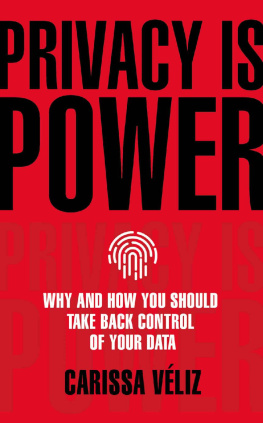
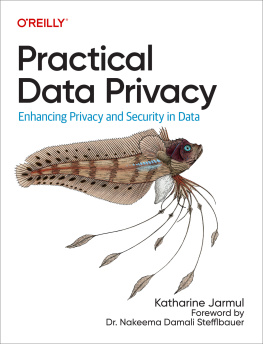
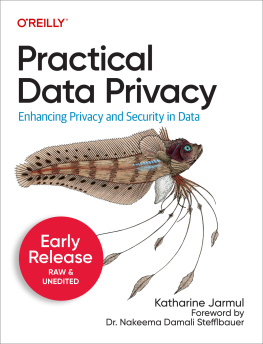
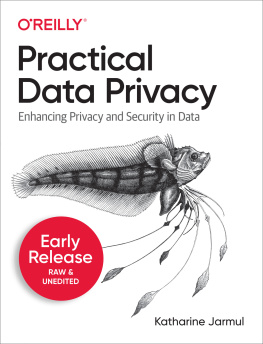
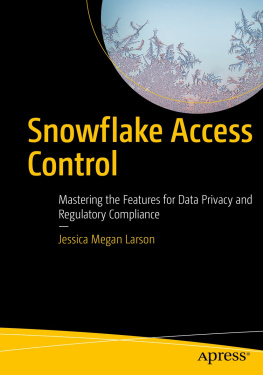
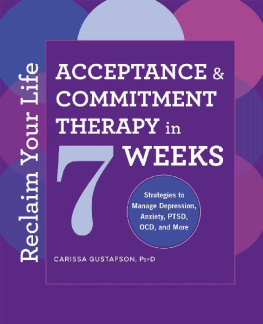
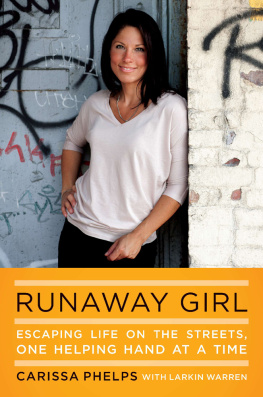
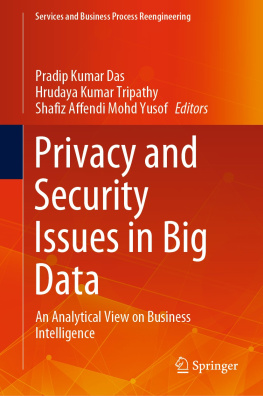
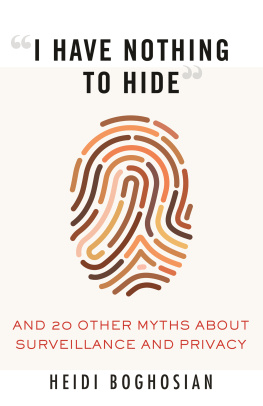
![Terence Craig and Mary E. Ludloff - Privacy and big data: [the players, regulators, and stakeholders]](/uploads/posts/book/229294/thumbs/terence-craig-and-mary-e-ludloff-privacy-and-big.jpg)

